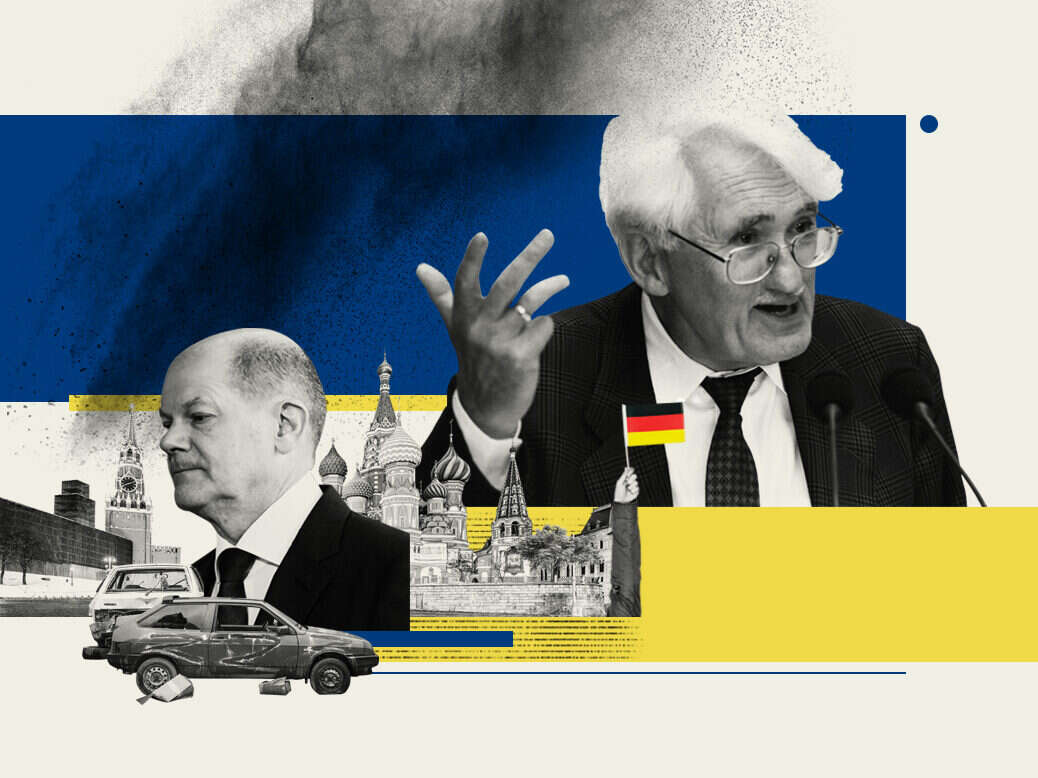
Vladimir Putin’s invasion of Ukraine has upended world politics and nowhere extra so than in Germany. Addressing an emergency session of the Bundestag on 27 February, German chancellor Olaf Scholz declared a Zeitenwende, a turning level in historical past. Russia’s assault on Ukraine meant Europe and Germany had entered a new age. But what course is historical past delivering?
Scholz promised to boost Germany’s defence spending and in March positioned a big order for America’s exorbitant F-35 fighter jets. Since then, sanctions on Russia have been tightened and Germany has even agreed to ship heavy weapons to Ukraine. But Berlin has baulked at an all-out boycott of Russian oil and fuel, and what it has to supply Kyiv militarily is proscribed even in comparison with different European nations, not to mention the United States. Always there’s a suspicion of delay, reluctance and concern. In Germany and elsewhere this has been learn as nothing lower than a crisis of political identity. More than anyplace else in the West, the total German mental class, and each TV speak present and newspaper has been mobilised to debate and criticise Germany’s efficiency. The state of affairs has been aggravated after Volodymyr Zelensky’s assault on Germany’s long-running détente with Russia in a speech to the Bundestag in March and a stream of remarkably forthright feedback from Ukraine’s ambassador to Berlin. You can inform issues have gotten actually critical as a result of Jürgen Habermas, the 92-year previous doyen of German philosophy and political commentary, has entered the ring, for as soon as on the aspect of the authorities.
Russia’s aggression poses such basic questions for Germany as a result of the nation in its present type owes its existence to the peaceable finish of the Cold War that enabled reunification. The success of 1989-90 was ready by virtually 20 years of Ostpolitik, during which commerce and détente with the Soviet Union labored to attract again the Iron Curtain. Maintaining good relations with Moscow has at all times meant making a pact with the satan, first with the repressive Soviet regime in the Nineteen Seventies and Nineteen Eighties and then with Vladimir Putin since the 2000s. After Russia’s invasion of Georgia in 2008, after the annexation of Crimea in 2014, and after the poisoning of Alexei Navalny in 2020, Berlin has repeatedly shrugged and carried on. But Putin’s assault on Ukraine and Ukraine’s exceptional resistance have made that method unattainable.
The query is especially explosive as a result of in the late Sixties it was Chancellor Scholz’s celebration, the Social Democratic Party (SPD), then led by the charismatic Willy Brandt, that launched Ostpolitik. Détente runs deep in the SPD, as personified by Gerhard Schröder, ex-chancellor and unrepentant chairman of the board at Russian state oil agency Rosneft. But the attachment will not be confined to the social democrats. Voices on the German proper have lengthy favoured a modus vivendi with Russia, whether or not below the Tsar, the Soviets or now below Putin. For them, Bismarck is the mannequin in balancing between East and West. In 2013, the international coverage manifesto of the far-right Alternative für Deutschland (AfD) drew inspiration straight from the Iron Chancellor in arguing for a self-confident nationwide international coverage, however one which recognised Russia’s significance for German historical past, again to the age of Frederick the Great, and which revered Russia’s pursuits in the successor states to the Soviet Union. This tendency is bolstered by an undercurrent of anti-Americanism that’s notably pronounced on the far left in Die Linke. And, as has develop into embarrassingly clear in current months, there’s a common disregard on many sides in Berlin for the nationwide rights of “smaller” east European states – notably Poland and Ukraine – which have the misfortune to seek out themselves wedged between Germany and Russia. Meanwhile, German industrial corporations resembling Siemens look again on 150 years of doing worthwhile enterprise in Russia, relations which they’re unwilling to have disrupted by a bagatelle like the annexation of Crimea.
But as German as all this can be, these components have been at work round the world after the finish of the Cold War. Oil is way greater enterprise than the Russian fuel on which Germany relies upon, and it was British, American and French oil majors that made the massive investments in Russia in the Nineties and 2000s. In diplomacy, the Gaullist custom in France additionally seems to stability between Washington and Moscow. In Italy sympathy for Russia runs deep. And then there’s Londongrad.
Content from our companions



It could be fatuous additionally to recommend that it is just now, with Putin’s invasion of Ukraine, that Ostpolitik has develop into contentious in Germany. Whether in Bonn or Berlin it was by no means merely hegemonic. At its inception in the late Sixties, the international coverage of Willy Brandt’s progressive social-liberal coalition was bitterly attacked from the proper. It was at all times a matter of balancing. Though they appeared for good working relations with Moscow, chancellors Helmut Schmidt, Helmut Kohl and Angela Merkel have been all staunch Atlanticists. Being an avowed Putin-versteher (“understander”) is a mark not of mainstream however fringe opinion in Germany. Die Linke and the AfD could have strong help in the former GDR, however neither is ever more likely to enter nationwide authorities. Tellingly, the Green celebration that was as soon as considered a neutralist Trojan horse for German nationalism has lengthy since transformed to a international coverage that’s outlined by the primacy of human rights and, on that foundation, a strong alignment with “the West”.
Crude stereotypes don’t seize the complexity of German politics. The truth is that the downside of balancing Russia for Germany is actual and that German international relations and German democracy are contentious, and healthily so. No one embodies that historical past extra persistently than Jürgen Habermas.
Half a century in the past Habermas emerged as the inheritor in West Germany to the model of vital principle generally known as the Frankfurt School – named for the Institute for Social Research based at Frankfurt University in 1929. From its roots in interwar Marxism, Habermas recentred his vital principle in the Sixties and Nineteen Seventies not on labour however on communication. His lifelong preoccupation has been with the chance of motive and emancipation that inheres in language, discourse and deliberation. Driven by this dedication to a practice that he traces again to the Enlightenment, he distanced himself in the Nineteen Eighties from radical French thinkers resembling Michel Foucault and Jacques Derrida. In the late Nineties he supported Nato’s bombing of Kosovo. All of which earned him a fame as an apologist for Western energy.
But to deduce that Habermas is a conformist determine is to deeply misunderstand his philosophy, his politics, however most of all his public position in trendy Germany. For 70 years, he has been an argumentative and at instances polemical pressure in the public lifetime of the Federal Republic. In the Nineteen Fifties and Sixties he challenged Martin Heidegger’s hyperlinks to Nazism and the pieties of the Cold War. In 1968 he mediated with the radical college students. In Nineteen Seventies he formulated a posh principle of legitimation crisis. In the Nineteen Eighties he opposed nuclear rearmament and denounced the nationalist and revisionist flip in historiography, which threatened to relativise the singularity of the Holocaust. At the second of nationwide unification in 1990 he demanded not merely an Anschluss of East Germany however a constitutional conference. In the late Nineties his advocating, together with Joschka Fischer, that the Greens approve intervention in Kosovo in the title of the accountability to guard was a contentious and troublesome line to observe. In 2003 Habermas orchestrated a typical entrance with Derrida towards the warfare in Iraq. Between 2010 and 2015, after having lengthy criticised the judicialisation of German politics below the authority of the highly effective constitutional court docket, he denounced the technocratic drift of Eurozone coverage.
This will not be the monitor report of a conformist. In 2022, Habermas as soon as once more fears a recrudescence of the proper below the mantle of enthusiasm for Ukraine’s resistance. And as soon as once more his lengthy and considerate article in the Süddeutsche Zeitung on 28 April has been met with a storm of disapproval. As has usually been the case, this outrage has been given a platform in the pages of the conservative Frankfurter Allgemeine Zeitung. This time Habermas stands accused of defending a battered and discredited custom of West German politics, conniving with Putin, and clinging to previous nostrums about nuclear warfare whereas patronising the Ukrainians and their supporters amongst youthful generations of Germans.
It didn’t assist his trigger that Habermas’s essay was bracketed with a misbegotten open letter that adopted what could be described as a defeatist place. The radical theorist and multimedia activist Alexander Kluge managed to inform a radio interviewer that his lesson from give up in 1945 was that give up was no unhealthy factor. He uncared for to say that it was the Americans that his hometown surrendered to. Alice Schwarzer, a large of German feminism, has insisted that Zelensky is a provocateur. The open letter they signed queried the proper not solely of Ukraine’s authorities to lecture Germany on the applicable coverage, however even Zelensky’s proper to talk for his personal folks, who, the German signatories imagined, may want a right away ceasefire and negotiations.
Habermas didn’t signal the letter. He is not any pacifist. The objection to violence has its restrict at the level when basic freedoms are at stake. Habermas concedes that weapons deliveries to Ukraine are important. What he objects too will not be the requires extra to be carried out, however the method during which they’re made. What worries him is “the self-assurance with which the morally indignant accusers in Germany are going after an introspective and reserved federal government”.
That self-assurance betrays itself. Every right-thinking individual can clearly agree that Putin’s aggression should not be allowed to succeed. But we also needs to agree {that a} warfare with Russia is unthinkable. Russia is a nuclear energy and escalation is an appalling danger. Any good-faith political intervention, Habermas insists, should squarely face this dilemma.
For the West, Habermas wrote, “having made the decision to not intervene in this conflict as a belligerent, there is a risk threshold that precludes an unrestrained commitment to the armament of Ukraine… Those who ignore this threshold and continue aggressively and self-assuredly to push the German chancellor towards it have either overlooked or not understood the dilemma into which this war has plunged the West… because the West, with its morally well-grounded decision to not become a party in this war, has tied its own hands.”
In gentle of this dilemma, the impatience of Scholz’s critics, who embody not simply Ukrainian spokespeople and right-wing hawks, however many former pacifists in the ranks of the Green celebration, will not be harmless. What is being known as into query, Habermas fears, is “the broad pro-dialogue, peace-keeping focus of German policy”, which ought to by no means be taken without any consideration. It was laborious gained and, as Habermas notes, has “repeatedly been denounced from the right”.
Those who argue that to take account of Russia’s nuclear menace is to succumb to blackmail have a degree. But their error is to think about that by pointing this out they’ve one way or the other ended the argument. In truth, all they’ve carried out is to restate the downside. As Habermas notes, “Those who object to pursuing a ‘policy of fear’ in a rationally justifiable manner already find themselves within the scope of argumentation of the kind that Chancellor Olaf Scholz correctly insists on – namely that of careful consideration in a politically responsible and factually comprehensive fashion.”
This mode of argument is typical of Habermas. At the identical time as he gives a pointy political critique, he seeks to reveal the preconditions for rational settlement. In one other attribute transfer he additionally gives an evaluation of the socio-political foundations for the present confusion. The final motive for the depth of the German debate lies, in accordance with Habermas, in the warfare unleashing not a lot a decisive historic flip, in Scholz’s phrases, however a conflict of various temporalities. A conflict, as Habermas places it, between “contemporaneous but historically non-simultaneous mentalities”.
Part of the pressure arises inside Germany itself. As critics have alleged and Habermas readily concedes, he and his technology are indelibly formed by the politics of the atomic age and its aftermath. This dictated an finish to navy historical past in any typical sense.
Their kids and grandchildren inherited a tradition that’s, if something, much more satisfied of the pressure of worldwide legislation. And on Habermas’s studying it’s exactly this normative dedication that leads them to demand that Putin be introduced earlier than the Hague. Incongruously, it’s Habermas, of all folks, who’s pressured to remind them that neither Russia nor the United States settle for the authority of the worldwide court docket and that demanding Putin be delivered to trial as a warfare prison could be tantamount to a declaration of warfare. For former pacifists now to make the defence of Ukraine right into a simply warfare campaign is, as Habermas places it, not a lot a flip to realism as realism turned on its head. The widespread denominator is a passionate dedication to normative requirements in the face of harsh realities.
Then there’s the enigmatic determine of Putin himself. What time does he belong to? Is he a creature of Russia’s deep historical past? Or, as Habermas prefers, a resentful parvenu born out of the collapse of Soviet energy? Is he a real nuclear menace, prepared to go all the method? Or is he bluffing? Part of our disorientation is exactly that we can’t resolve how significantly to take him.
Finally, there’s the nice shock of the crisis, which is Ukraine and its exceptional resistance. As Habermas remarks: “Mixed in with our admiration of Ukraine is an element of amazement at the certainty of victory and the unbroken courage of the soldiers and recruits of all ages, grimly determined to defend their homeland from a militarily far superior enemy.”
For Habermas this too is an expression of the contemporaneity of the uncontemporaneous. Ukraine is at the stage of constructing a nation state, Germany is properly past that. In checking their spontaneous reactions of enthusiasm and solidarity with Ukraine, Germans and the remainder of us in the West could be properly suggested to think about this hole and what it implies. We thrill to the heroism of the Ukrainians, which places into stark aid the deflated state of our personal politics. But our post-heroic tradition can’t merely be forged off in disgust. It is a logical historic impact of the Nato umbrella that we proceed to reside below. Ukraine’s determined braveness, on the different hand, is a mirrored image of the undeniable fact that it doesn’t. Under these circumstances, Habermas asks, “is it not a form of pious self-deception to bank on a Ukrainian victory against Russia’s murderous form of warfare without taking up arms yourself? The bellicose rhetoric is inconsistent with the bleachers from which it is delivered.”
This distance between established nation states and the nation-state-to-be has implications for each side. It ill-behoves us to cheer for extra blood from the security of the stands. But Ukraine additionally wants to think about its diplomatic techniques.
Habermas has been accused of suggesting that Volodymyr Zelensky and Ukraine’s data warriors are manipulating us by means of their slick media op and participating in ethical blackmail, which in fact they’re. Nor is there any disgrace in that. Kyiv is preventing the data warfare with the identical dedication and ability it’s displaying on different fronts. It is doing precisely what it should do. Habermas’s level is extra delicate.
Ukraine performs on Germans’ guilt at their very own passivity. But Germany’s personal place is warranted by its historical past. As Habermas remarks: “Allies should not reproach each other for different political mentalities that historically do not match in view of being still involved in the becoming of a nation state or having passed that kind of formation process.”
Ukraine and Germany need to be taught to work together throughout this developmental divide. This would require tact, perception and diplomacy. As Habermas remarks: “… such differences should be accepted as fact and cleverly accounted for in cooperation. But as long as these perspective-defining differences remain in the background, they only result in emotional confusion.”
This was seen in the response to Zelensky’s stunning speech to the Bundestag, during which he dismissed Germany’s consideration to the reminiscence of the Holocaust as nugatory lip service. Though the authorities and the Bundestag gave no time to dialogue of the speech, the public at massive reacted, in accordance with Habermas, with a confused combination of “raw intimations of approval” and spontaneous identification with Zelensky’s place, and at the identical time a defensive assertion of self-respect.
Zelensky’s was a blunt assault, which with its “neglect of historically founded differences in the perception and interpretation of war doesn’t just lead to significant mistakes in dealing with each other. Even worse, they lead to a reciprocal misunderstanding of what the other actually thinks and wants.”
What Habermas is warning his fellow Germans towards is the mirage that by the use of Ukraine there’s some street again to the future. The post-heroic perspective is a traditionally applicable response to the historical past of Europe since the finish of the Second World War and the Cold War. Seeking to shut the emotional and cultural hole to Ukraine amid the continued actuality of the nuclear stand-off is each unrealistic and harmful. The problem we now have to collectively face is tips on how to provide real help whereas recognising distance. One may say that Habermas is urging us to determine the politics of allyship on the worldwide stage and below the shadow of the nuclear menace.
What is evident is that we should discover a constructive method out of the dilemma posed by the warfare, a method out that should, as Habermas says in his closing line, be outlined by one fundamental aspiration: “Ukraine ‘must not lose’ this war.” Its mission of constructing a nation state should proceed.
For Europe itself the process is completely different. What the distinction with Ukraine should reveal will not be a lot the lack of a correctly heroic nationwide identity, however the lack of post-national capacities at the EU degree. As Habermas remarks, there’s a motive why those that have declared a historic turning level are those that have for a very long time argued that Europe should be capable of stand by itself toes militarily if it needs to make sure that its “social and political way of life” will not be destabilised from with out or hollowed out from inside. That wouldn’t reply Ukraine’s heroism in sort however it will at the very least enable Europe to resolve on its coverage independently each of the US and Russia. Right now, American politicians are falling over themselves to supply tens of billions of {dollars} in assist to Ukraine in its combat with Russia. That they’ll agree on that and not on healthcare or local weather change coverage is an indication of America’s personal dysfunction. But what US politics will herald the close to future is anybody’s guess. Soon Europe could also be going through a disorientating conflict of historic temporalities and political time not in japanese Europe however throughout the Atlantic. As Habermas reminds us, Macron’s re-election opens one other window of alternative. Will Europe seize it?
After the Zeitenwende: Jürgen Habermas and Germany’s new identity crisis & More Latest News Update
After the Zeitenwende: Jürgen Habermas and Germany’s new identity crisis & More Live News
All this information that I’ve made and shared for you folks, you’ll prefer it very a lot and in it we hold bringing subjects for you folks like each time so that you simply hold getting information data like trending subjects and you It is our aim to have the ability to get
every kind of stories with out going by means of us in order that we will attain you the newest and finest information totally free as a way to transfer forward additional by getting the data of that information along with you. Later on, we are going to proceed
to offer details about extra today world news update forms of newest information by means of posts on our web site so that you simply at all times hold shifting ahead in that information and no matter sort of data shall be there, it’ll undoubtedly be conveyed to you folks.
After the Zeitenwende: Jürgen Habermas and Germany’s new identity crisis & More News Today
All this information that I’ve introduced as much as you or shall be the most completely different and finest information that you simply persons are not going to get anyplace, together with the data Trending News, Breaking News, Health News, Science News, Sports News, Entertainment News, Technology News, Business News, World News of this information, you will get different forms of information alongside together with your nation and metropolis. You will be capable of get data associated to, in addition to it is possible for you to to get details about what’s going on round you thru us totally free
as a way to make your self a educated by getting full details about your nation and state and details about information. Whatever is being given by means of us, I’ve tried to convey it to you thru different web sites, which you’ll like
very a lot and if you happen to like all this information, then undoubtedly round you. Along with the folks of India, hold sharing such information essential to your family members, let all the information affect them and they’ll transfer ahead two steps additional.
Credit Goes To News Website – This Original Content Owner News Website . This Is Not My Content So If You Want To Read Original Content You Can Follow Below Links
